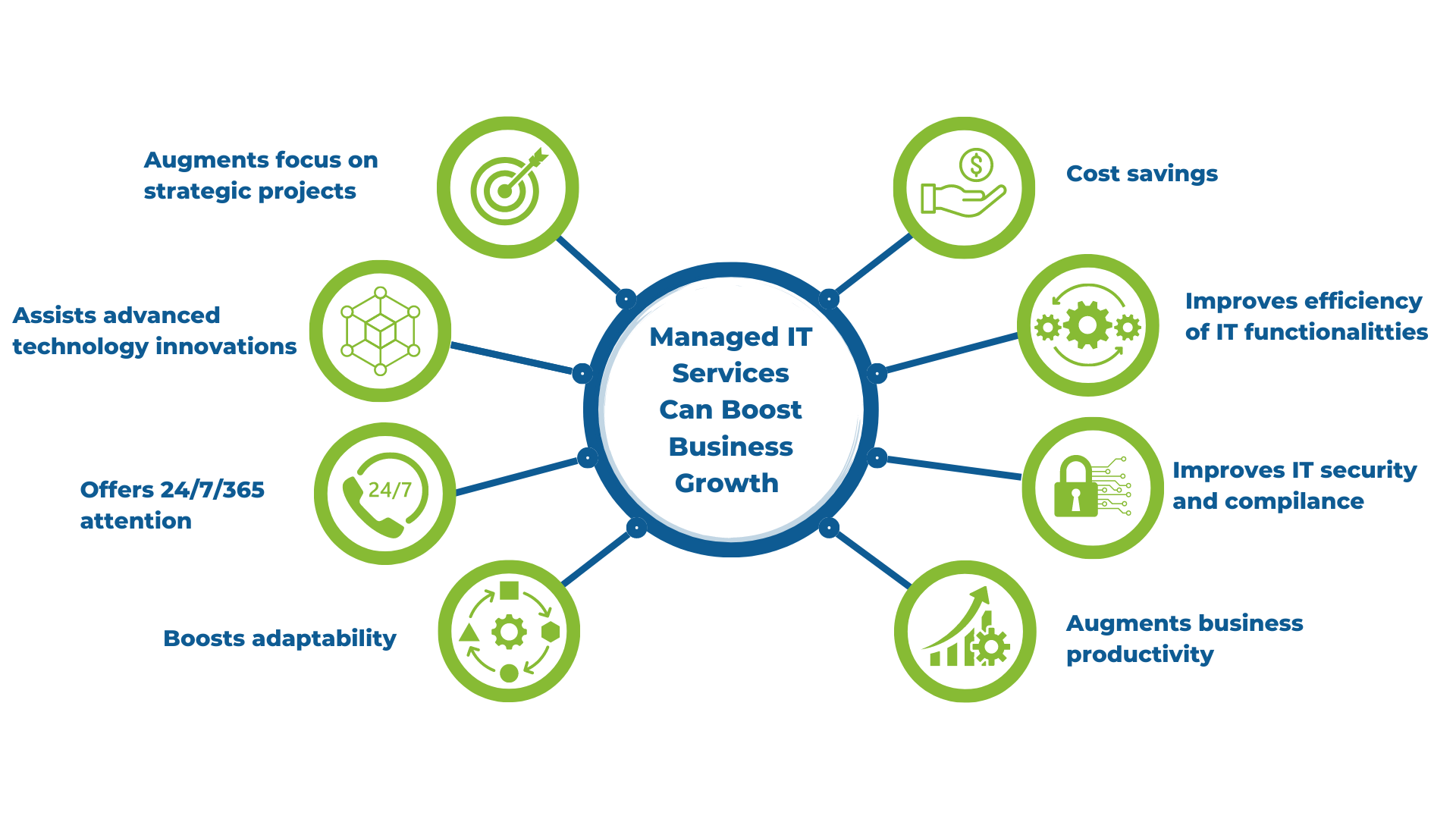In today’s digital landscape, businesses face increasing pressure to enhance productivity and efficiency. Managed IT services have emerged as a valuable solution to meet these challenges. This blog post examines the role of improving business operations and driving efficiency.
Understanding Managed IT Services
Gain insights into how can enhance business operations, improve productivity, and streamline IT management through proactive monitoring, support, and strategic guidance.
What are Managed IT Services?
Managed IT services involve outsourcing the proactive management and maintenance of IT systems to a specialized service provider. Unlike traditional IT support, it focus on prevention, timely response, and ongoing support.
Benefits
Managed IT services offer several benefits to businesses. These include improved IT infrastructure reliability, enhanced cybersecurity measures, reduced downtime, proactive support, scalability, and cost savings compared to in-house IT support.
Types of Management
Explore the various types of managed IT services available, including network and infrastructure management, data backup and recovery, security and compliance management, and more, each designed to address specific IT needs.

Network and Infrastructure Management
Network and infrastructure management services ensure the stability and performance of IT systems. This includes network monitoring, regular maintenance, hardware and software upgrades, and disaster recovery planning.
Data Backup and Recovery
Data backup and recovery services protect businesses from data loss and ensure rapid recovery in case of emergencies. This providers implement regular backups, secure off-site storage, and efficient data recovery processes.
Security and Compliance Management
Managed IT services focus on robust cybersecurity and compliance with industry regulations. This involves firewall management, antivirus protection, intrusion detection, vulnerability assessments, and ongoing security updates.
Cloud Computing Services
Managed IT service providers offer cloud computing services, enabling businesses to leverage cloud infrastructure, storage, and applications. This includes migration to the cloud, server management, virtualization, and ensuring data security in the cloud environment.
Help Desk and Technical Support
Help desk and technical support services provide businesses with prompt assistance and troubleshooting for IT-related issues. Managed service providers offer 24/7 help desk support, remote assistance, and ticket management to ensure timely resolution of technical issues.
IT Consulting and Strategy Managed
IT service providers offer IT consulting and strategic planning services to help businesses align their IT infrastructure with their overall goals. This includes technology assessments, IT roadmaps, and guidance on leveraging emerging technologies for business growth.
Vendor Management
These services involve managing relationships with IT vendors and coordinating software and hardware procurement. Managed service providers help businesses select the right vendors, negotiate contracts, and ensure smooth integration of third-party solutions.
Mobile Device Management (MDM)
Managed IT service providers offer mobile device management services to secure and manage mobile devices used by employees. This includes device configuration, data encryption, application management, and enforcing security policies on mobile devices.
IT Asset Management
Help businesses effectively manage their IT assets throughout their lifecycle. This includes asset tracking, software license management, hardware inventory, and ensuring compliance with software usage agreements.
These examples highlight the diverse range of managed IT services available to businesses, allowing them to leverage specialized expertise and resources to optimize their IT infrastructure and enhance efficiency.
Related Post 👉 How to Manage an Offshore Team: Cool Tips and Best Practices
Cost Considerations
Understand the cost factors associated with managed IT services, such as service level agreements, pricing models (fixed fee or pay-as-you-go), scalability options, and potential cost savings in terms of reduced downtime, improved productivity, and predictable IT budgeting.

- Budget Planning: Managed IT services require budget allocation, so it’s important to assess your business’s financial capabilities and determine how much you can allocate for outsourcing IT services. Consider the value and benefits that managed services can bring to your business and align your budget accordingly.
- Cost Savings: While managed IT services come with a cost, they can also provide significant cost savings in the long run. By outsourcing IT functions, businesses can avoid upfront investments in infrastructure, hardware, and software. Additionally, managed services providers can offer economies of scale, providing access to advanced technologies and expertise at a fraction of the cost of building and maintaining an in-house IT department.
- Pricing Models: Managed IT service providers offer different pricing models, such as fixed monthly fees or pay-as-you-go options. It’s important to evaluate these pricing models and choose the one that best aligns with your business’s needs and financial situation. Consider factors such as the scope of services, scalability, and any additional costs or fees.
More costs to consider:
- Return on Investment (ROI): Assess the potential return on investment when considering managed IT services. Evaluate the expected benefits and improvements in productivity, efficiency, security, and scalability that managed services can provide. By comparing the potential ROI with the costs involved, you can make an informed decision about the value of investing in managed IT services.
- Customization and Scalability: Consider the flexibility to scale and adapt to your business’s evolving needs. Look for providers who can customize their services to align with your specific requirements, allowing you to pay for only what you need and easily scale up or down as your business grows or faces changes in demand.
- Total Cost of Ownership (TCO): When evaluating the cost of MIS, consider the total cost of ownership. This includes not only the service fees but also factors like maintenance, upgrades, training, and ongoing support. Compare the TCO of managed services with the costs of in-house IT operations to determine the most cost-effective solution for your business.
Considering these cost considerations will help you assess the financial implications of adopting managed IT services and make an informed decision that aligns with your budget and business objectives.
Related Post 👉 How to measure the ROI of your IT Outsourced Software Development Team
Challenges and Disadvantages
Despite the numerous benefits, there are also challenges and disadvantages that businesses should be aware of.
| Benefits | Disadvantages |
| Improved IT Performance and Reliability | Dependency on Service Provider |
| Access to Expertise and Specialized Skills | Limited Control and Customization |
| Enhanced Cybersecurity Measures | Potential Communication and Responsiveness Issues |
| Scalability and Flexibility | Data Privacy and Security Concerns |
| Cost Savings and Predictable Budgeting | Vendor Lock-in |
By considering both the benefits and disadvantages, businesses can make a more informed decision about whether managed IT services are the right fit for their specific needs and requirements. It’s important to weigh the advantages against the potential challenges and take into account factors such as business goals, IT infrastructure, and risk tolerance.
Conclusion
In conclusion, this kind of management have emerged as a valuable solution to boost business efficiency in today’s digital age.
By outsourcing IT management to specialized service providers, businesses can benefit from improved reliability, enhanced security, scalability, and cost savings. With the right provider and effective communication, managing IT services can drive productivity and propel businesses towards success.
Despite the challenges and disadvantages, businesses can overcome them with the right partner. ParallelStaff, the leading provider of Managed IT Services in 2023, is here to help. Contact us today!
- What Are the Benefits of Using Python GUI Development? - May 29, 2024
- Mastering the Art of Making an AI: A Practical Guide - May 23, 2024
- Mastering Efficiency: Navigating the World of Microservices Architecture - April 21, 2024






